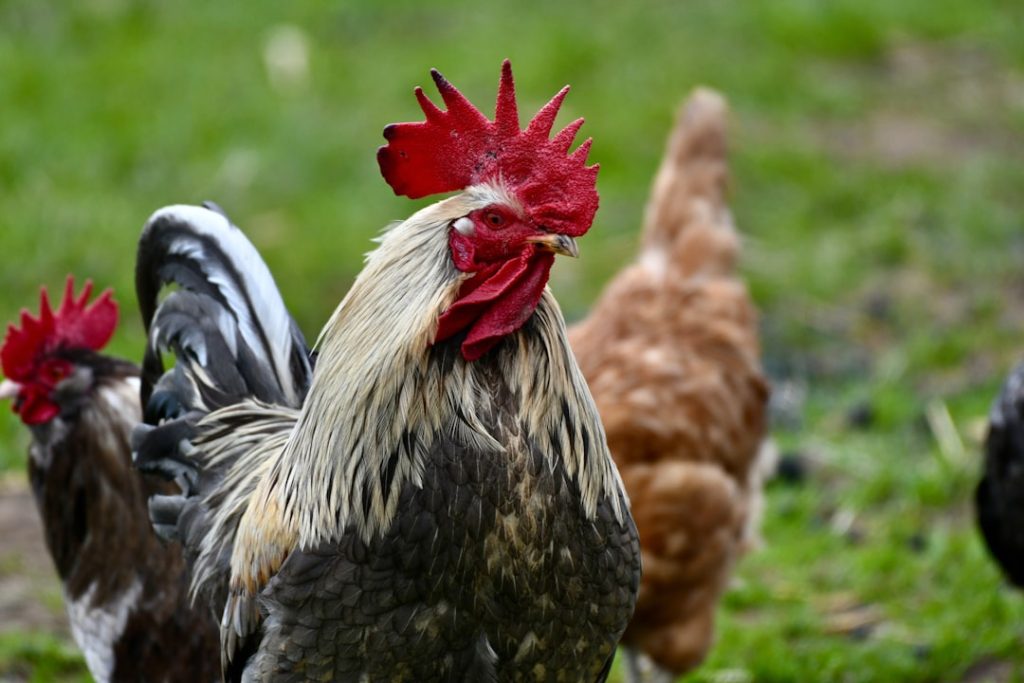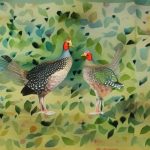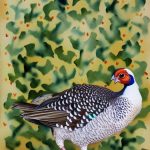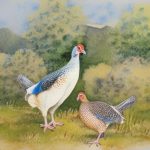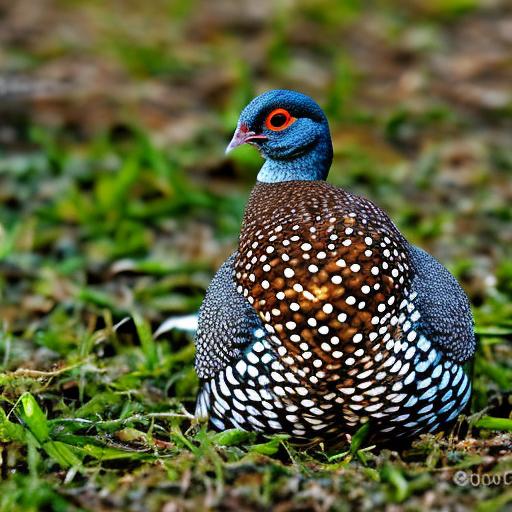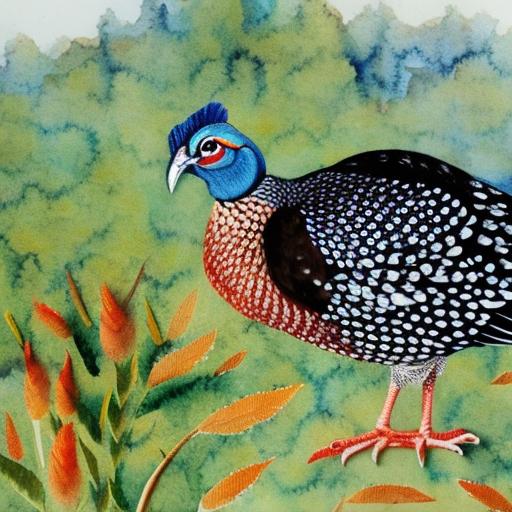Vulturine Guinea Fowl, also known as Acryllium vulturinum, are striking and unique birds native to East Africa. They are easily recognizable by their vibrant blue plumage, white spots, and a distinct vulture-like appearance. These birds are not only visually stunning but also possess fascinating social behaviors and make for excellent additions to a diverse aviary. Vulturine Guinea Fowl are highly social birds that thrive in flocks and are known for their intricate social structures and vocalizations. They are also excellent foragers and can be a valuable addition to a farm or homestead due to their ability to control insect populations. As a result, they have become increasingly popular among breeders and enthusiasts looking to add a touch of exotic beauty to their collection.
Vulturine Guinea Fowl are not only visually stunning but also possess fascinating social behaviors and make for excellent additions to a diverse aviary. They are highly social birds that thrive in flocks and are known for their intricate social structures and vocalizations. They are also excellent foragers and can be a valuable addition to a farm or homestead due to their ability to control insect populations. As a result, they have become increasingly popular among breeders and enthusiasts looking to add a touch of exotic beauty to their collection.
Table of Contents
Key Takeaways
- Vulturine Guinea Fowl are striking birds known for their vibrant blue plumage and unique appearance.
- Breeders play a crucial role in maintaining the health and genetic diversity of Vulturine Guinea Fowl populations.
- Breeding and rearing Vulturine Guinea Fowl requires careful attention to their natural behaviors and dietary needs.
- Caring for Vulturine Guinea Fowl involves providing suitable housing, protection from predators, and access to a balanced diet.
- Breeders should be aware of challenges such as disease prevention, predator control, and finding suitable markets for their birds.
The Role of a Vulturine Guinea Fowl Breeder
As a Vulturine Guinea Fowl breeder, one plays a crucial role in the preservation and propagation of these unique birds. Breeders are responsible for ensuring the health and well-being of their flock, as well as managing breeding programs to maintain genetic diversity and improve the overall quality of the birds. Additionally, breeders may also be involved in educating the public about Vulturine Guinea Fowl, promoting responsible ownership, and advocating for the conservation of these birds in their natural habitat.
Breeders must also have a deep understanding of the specific needs and behaviors of Vulturine Guinea Fowl in order to provide appropriate care and housing. This includes creating suitable breeding environments, providing proper nutrition, and managing the social dynamics within the flock. Furthermore, breeders may also be involved in the sale and distribution of Vulturine Guinea Fowl to other breeders, enthusiasts, or individuals looking to add these birds to their collection.
Breeding and Rearing Vulturine Guinea Fowl
Breeding Vulturine Guinea Fowl requires careful planning and management to ensure the health and genetic diversity of the flock. Breeders must carefully select breeding pairs based on desirable traits such as coloration, size, and overall health. Additionally, breeders may also need to consider the genetic background of each bird to avoid inbreeding and maintain a diverse gene pool within the flock.
Once breeding pairs have been selected, breeders must provide suitable nesting areas and conditions to encourage successful breeding. This may include providing secluded nesting boxes or areas with appropriate nesting materials to accommodate the natural behaviors of the birds. Additionally, breeders must closely monitor the breeding pairs to ensure that eggs are being properly incubated and that chicks are hatching successfully.
Rearing Vulturine Guinea Fowl chicks requires attentive care and proper nutrition to ensure their healthy development. Chicks should be provided with a balanced diet that meets their specific nutritional needs, as well as access to clean water and suitable living conditions. Breeders must also monitor the social dynamics within the flock to ensure that chicks are integrating successfully and receiving proper care from their parents or other adult birds.
Caring for Vulturine Guinea Fowl
Caring for Vulturine Guinea Fowl requires a deep understanding of their specific needs and behaviors. These birds thrive in spacious outdoor environments with access to natural vegetation, insects, and open space for foraging. Breeders must provide suitable housing that protects the birds from predators while allowing them to exhibit natural behaviors such as dust bathing, roosting, and socializing with other members of the flock.
Additionally, Vulturine Guinea Fowl require a balanced diet that includes a variety of grains, seeds, insects, and fresh greens. Breeders must carefully monitor the nutritional needs of their flock and provide appropriate supplements if necessary to ensure optimal health and vitality. Clean water should also be readily available at all times to prevent dehydration and maintain overall well-being.
Furthermore, breeders must also be attentive to the social dynamics within the flock, as Vulturine Guinea Fowl are highly social birds with complex hierarchies. Providing suitable enrichment activities and opportunities for natural behaviors can help reduce stress and promote overall well-being within the flock.
Challenges and Considerations for Vulturine Guinea Fowl Breeders
Vulturine Guinea Fowl breeding comes with its own set of challenges and considerations that breeders must be prepared to address. One of the primary challenges is maintaining genetic diversity within the flock to prevent inbreeding and maintain overall health and vitality. This may require careful selection of breeding pairs, as well as collaboration with other breeders to exchange birds and genetic material.
Additionally, Vulturine Guinea Fowl are susceptible to certain diseases and parasites that can impact their health and well-being. Breeders must be vigilant in monitoring the health of their flock and implementing appropriate preventative measures such as vaccination programs, parasite control, and biosecurity protocols.
Furthermore, breeding Vulturine Guinea Fowl requires a significant investment of time, resources, and expertise. Breeders must be prepared to dedicate themselves to the care and management of their flock, as well as stay informed about best practices in breeding, nutrition, and overall bird health.
Selling and Marketing Vulturine Guinea Fowl
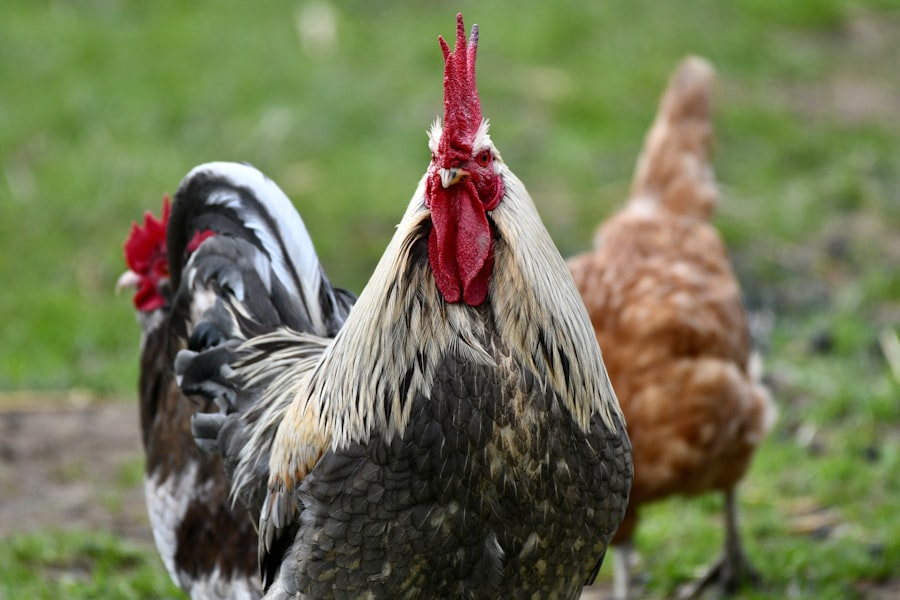
Selling and marketing Vulturine Guinea Fowl requires careful consideration of the target audience, as well as compliance with local regulations regarding bird sales and transportation. Breeders may choose to sell their birds directly to other breeders or enthusiasts through online platforms, bird shows, or local markets. Additionally, breeders may also work with pet stores or aviaries to distribute their birds to a wider audience.
When marketing Vulturine Guinea Fowl, breeders should highlight the unique characteristics and beauty of these birds, as well as their suitability for various purposes such as pest control or ornamental display. Providing accurate information about the care requirements and behavior of Vulturine Guinea Fowl can help potential buyers make informed decisions about adding these birds to their collection.
Breeders should also be prepared to provide ongoing support and guidance to buyers regarding the care and management of Vulturine Guinea Fowl. This may include offering resources such as care guides, access to veterinary support, or advice on integrating new birds into an existing flock.
The Future of Vulturine Guinea Fowl Breeding
The future of Vulturine Guinea Fowl breeding holds great promise for those dedicated to the preservation and propagation of these unique birds. As interest in exotic avian species continues to grow, there is an increasing demand for responsibly bred Vulturine Guinea Fowl among enthusiasts, collectors, and farmers alike.
Breeders play a crucial role in ensuring the health, genetic diversity, and overall well-being of Vulturine Guinea Fowl populations. By staying informed about best practices in breeding, nutrition, and disease management, breeders can contribute to the long-term sustainability of these birds while promoting responsible ownership and conservation efforts.
As more people become aware of the beauty and benefits of Vulturine Guinea Fowl, there is an opportunity for breeders to educate the public about these birds and advocate for their conservation in their natural habitat. By working together with other breeders, conservation organizations, and avian enthusiasts, the future of Vulturine Guinea Fowl breeding looks bright as these stunning birds continue to capture the hearts of bird lovers around the world.
If you’re a vulturine guinea fowl breeder, you may also be interested in learning about duck mating seasons. Understanding the breeding patterns of ducks can provide valuable insights into managing your own breeding program. Check out this informative article on PoultryWizard to gain a deeper understanding of duck mating behaviors and how it can relate to your guinea fowl breeding efforts.
FAQs
What is a vulturine guinea fowl breeder?
A vulturine guinea fowl breeder is a person or business that specializes in breeding and raising vulturine guinea fowl for various purposes, such as conservation, exhibition, or commercial production.
What are vulturine guinea fowl?
Vulturine guinea fowl (Acryllium vulturinum) are a species of large, strikingly beautiful guinea fowl native to East Africa. They are known for their unique appearance, with vibrant blue plumage, white spots, and a distinctive vulturine-like neck and head.
What does a vulturine guinea fowl breeder do?
A vulturine guinea fowl breeder is responsible for the care, breeding, and management of vulturine guinea fowl. This includes providing proper housing, nutrition, and healthcare for the birds, as well as overseeing breeding programs to maintain genetic diversity and produce healthy offspring.
What are the requirements for becoming a vulturine guinea fowl breeder?
To become a vulturine guinea fowl breeder, individuals should have a strong understanding of avian husbandry, genetics, and breeding techniques. They should also have suitable facilities for housing and caring for the birds, as well as a commitment to the welfare and conservation of vulturine guinea fowl.
Where can I find a vulturine guinea fowl breeder?
Vulturine guinea fowl breeders can be found through online directories, avicultural organizations, and poultry shows and exhibitions. It is important to research and choose a reputable breeder who prioritizes the health and well-being of their birds.
Meet Walter, the feathered-friend fanatic of Florida! Nestled in the sunshine state, Walter struts through life with his feathered companions, clucking his way to happiness. With a coop that’s fancier than a five-star hotel, he’s the Don Juan of the chicken world. When he’s not teaching his hens to do the cha-cha, you’ll find him in a heated debate with his prized rooster, Sir Clucks-a-Lot. Walter’s poultry passion is no yolk; he’s the sunny-side-up guy you never knew you needed in your flock of friends!

